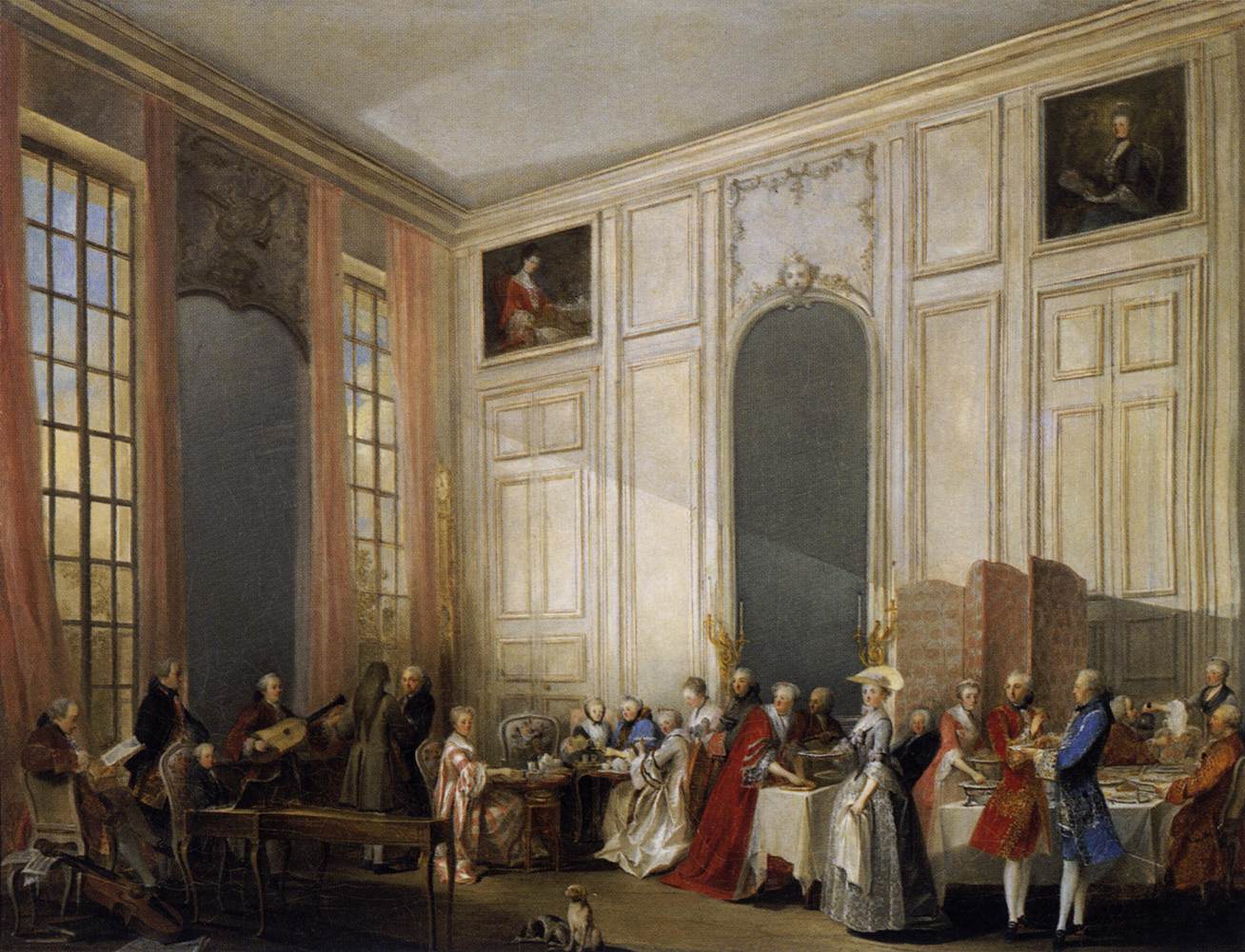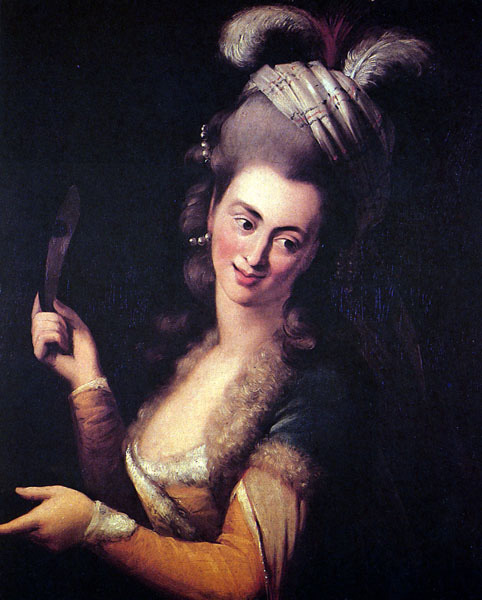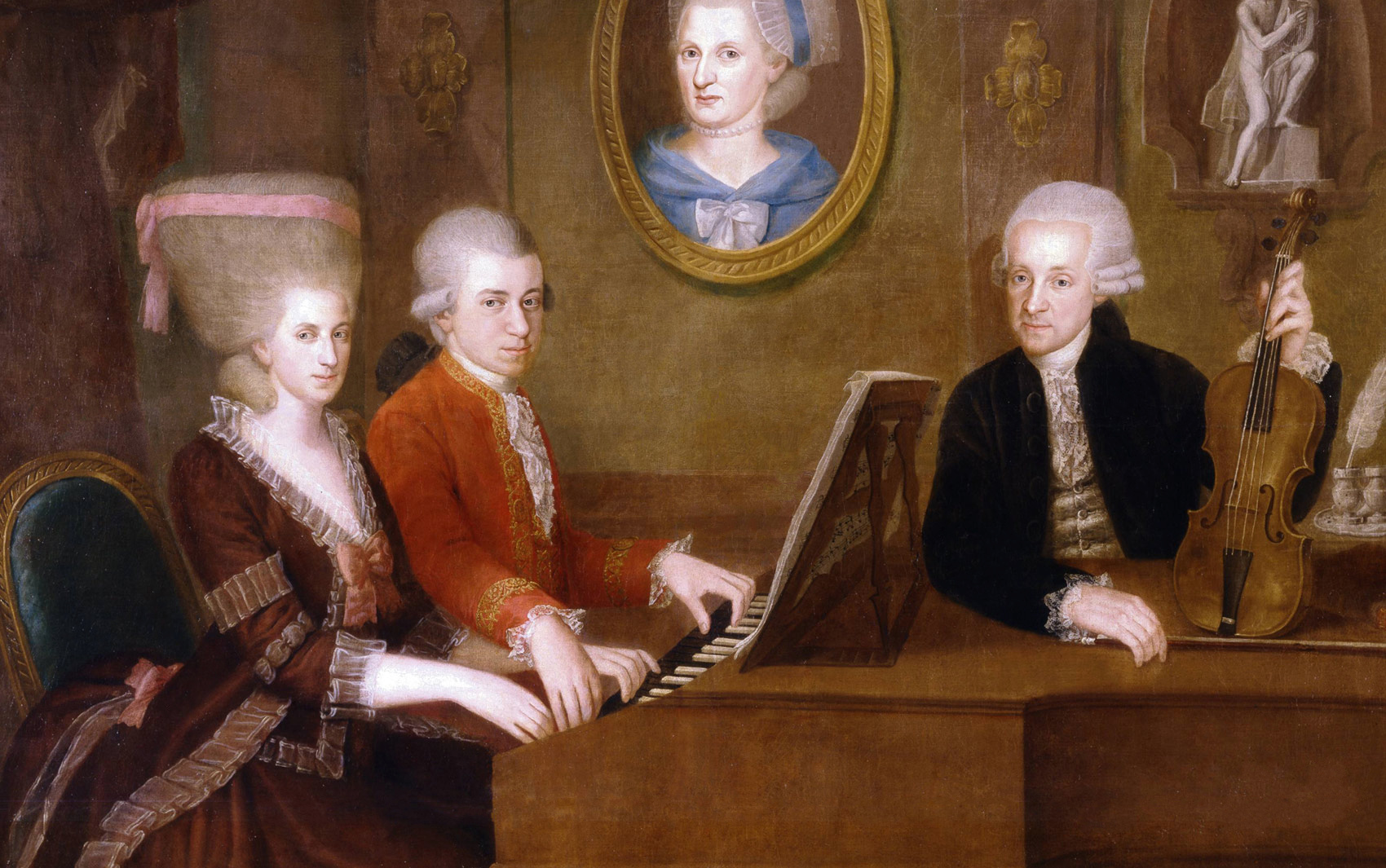_jouant_%C3%A0_Paris_avec_son_p%C3%A8re_Jean..._-_Google_Art_Project.jpg) |
| The Mozarts |
The Mozarts traveled around Europe beginning in 1762, when Wolfgang was only six-years-old. They played for Vienna's rich and noble society, which included Empress Maria Theresa at the Imperial Court. After that they traveled to France and played for the likes of King Louis XV and Madame de Pompadour, then to England to play for King George III and his Queen, to which Wolfgang dedicated six of his beautiful sonatas. Wolfgang met Johann Christian Bach, son of the Johann Sebastian Bach. As you can imagine, the Mozarts were rock stars, and their wallets were full from all these concerts they were so heavily paid for.
 |
| Afternoon Tea at the Temple by Michel-Barthélémy Ollivier Wolfgang is the little guy on the far left. |
After a brief break from show-business, Leopold and Wolfgang arrived in Italy in 1769 (the year Napoleon was born). During this visit, Wolfgang wrote some operas, which were all big hits. It was the usual business for the Mozarts, and in only a few years they were back at Salzburg.
 |
| Mozart as a young man |
 |
| Aloysia |
Childish Wolfgang's search for a career was an epic failure so far, but he had a good time for the most part, and that's great, right? He was now in Paris, and Leopold wished for his son and wife to introduce themselves to the court of Versailles. It seemed doable for Wolfgang. However, the Parisians didn't remember him, and if they did, it was only as a mere child star, and hardly anything more. To make things worse, Wolfgang and his mom were low on cash, not to mention his mother was sick. Mrs. Mozart passed away not long after they arrived. It was a miserable period in his life, as one can easily imagine. He failed to gain any inspiration, he was grieved at his loss, and he loathed Paris.
 |
| Nannerl and Wolfgang at the fortepiano with their father. A portrait of their late mother hangs on the wall. |
As any sane man would do, given it was possible, he returned home to Salzburg. Leopold and his son did not have a great relationship. Wolfgang was defiant and strived to be the very best, and went against his father's wishes by not wanting to accept another job at Salzburg. Wolfgang instead went to Vienna in search of better work.
 |
| Constanze |
Vienna was a great place of opportunity. Wolfgang taught, wrote many pieces and played concerts. Before long Wolfgang was in love with Aloysia's sister, Constanze. She loved music too, especially Bach's religious music. This made him more interested in baroque music, and he studied it very much during this period. Although Leopold would not hear of their marriage, the lovers married anyway in 1782, and they proved to be a very happy couple. They had two children who survived infancy.
 |
| A genius at work |
 |
| Leopold |
 |
| Wolfgang, c. 1790 |
Franz von Walsegg was the sorrowed man who commissioned the requiem, following the death of his wife. Instead of requesting it himself, he remained anonymous and sent intermediaries. Franz was an aspiring musician, but far from a respectable one; he would often commission works and then take the credit for them. Nevertheless Wolfgang began writing this requiem for the mysterious, faceless stranger. It was melodramatic, intensely emotional and devoutly spiritual. The musician himself was feeling very depressed. Franz Xaver Niemetschek, the first biographer of Mozart, wrote of him:
“On his return to Vienna, his indisposition increased visibly and made him gloomily depressed. His wife was truly distressed over this. One day when she was driving in the Prater with him, to give him a little distraction and amusement, and they were sitting by themselves, Mozart began to speak of death, and declared that he was writing the Requiem for himself. Tears came to the eyes of the sensitive man: ‘I feel definitely,’ he continued, ‘that I will not last much longer; I am sure I have been poisoned. I cannot rid myself of this idea.’”There have been rumors that Antonio Salieri, a fellow composer and teacher of Beethoven, Franz Schubert and Franz Liszt, indeed poisoned him, but we will never know. He was very disturbed by these accusations, and they contributed to his nervous breakdowns.
Wolfgang, bedridden and pathetic, was claimed by Niemetschek to have said:
“On the day of his death he asked for the score to be brought to his bedside. ‘Did I not say before, that I was writing this Requiem for myself?’ After saying this, he looked yet again with tears in his eyes through the whole work.”On December 5th, 1791, the composer died. He left behind him so many works. Even 223 years after his death, we cherish and admire his craftsmanship, and I'm sure even 1,000 years from now we will still remember his music. Wolfgang Amadeus Mozart is one of the very staples of classical music.
 |
| Wolfgang, 14 years old |
Bibliography
- “Death of Wolfgang Amadeus Mozart.” Wikipedia. Wikimedia Foundation, 08 Feb. 2014. Web. 04 Aug. 2014. <https://en.wikipedia.org/wiki/Death_of_Wolfgang_Amadeus_Mozart>.
- “Life of Wolfgang Amadeus Mozart.” Music With Ease. N.p., n.d. Web. 04 Aug. 2014. <http://www.musicwithease.com/mozart-life.html>.
- “A Mozart Biography.” Life and Music of Mozart. N.p., n.d. Web. 04 Aug. 2014. <http://www.mozart.biz/>.
- “Requiem (Mozart).” Wikipedia. Wikimedia Foundation, n.d. Web. 04 Aug. 2014. <https://en.wikipedia.org/wiki/Requiem_(Mozart)>.
- “Salzburg – Where Everything Started.” Mozart. N.p., n.d. Web. 04 Aug. 2014. <http://www.mozart.com/en/timeline/life/birth-family-and-childhood-salzburg-austria/>.
- “Wolfgang Amadeus Mozart.” Wikipedia. Wikimedia Foundation, n.d. Web. 04 Aug. 2014. <https://en.wikipedia.org/wiki/Wolfgang_Amadeus_Mozart>.
- “Wolfgang Mozart Biography.” Bio.com. A&E Networks Television, n.d. Web. 04 Aug. 2014. <http://www.biography.com/people/wolfgang-mozart-9417115>.
No comments:
Post a Comment